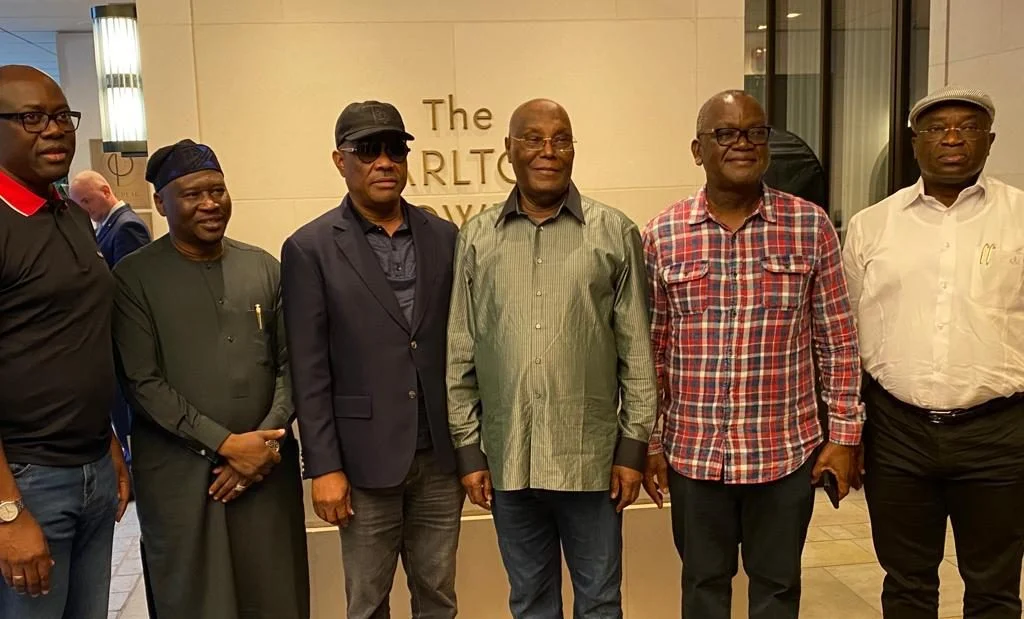AHEAD of the 2023 polls, public attention is riveted on politics. But the electorate’s dream of a better Nigeria appears bleak with the recent embarrassing penchant of state governors and leading politicians to embark on jamborees to London for political meetings. Alarmingly, governors, presidential candidates of the leading parties and a former President, Olusegun Obasanjo, jetted to the British capital for a series of meetings. They abandoned the home front, where insecurity, economic and social crises have rendered life brutish for the majority. A group of elder statesmen have described the trend as shameful.
Prominent among the London summiteers are presidential candidates of the three biggest political parties. The trio do not currently hold any public office and can rightly claim freedom of movement. Not so incumbent public office holders. The candidates were in cahoots in London with some state governors; Nyesom Wike (Rivers), Samuel Ortom (Benue), Okezie Ikpeazu (Abia) and Seyi Makinde (Oyo).
Really, there is nothing legally wrong with travelling to London, especially for private persons. Freedom of movement remains a fundamental right in or out of public office. On deeper interrogation, however, these are meetings where governors whose states face serious challenges at home are seeking personal benefits post-2023 at public expense. They had nothing to do with their official duties or the welfare of the people. It is embarrassing for a country that is not at war for its leaders to be holding meetings ostentatiously in foreign territories to determine the country’s trajectory.
The last time Nigeria’s leaders met abroad to chart its future was in 1967 amidst the existential crisis in the run-up to the start of the Nigerian Civil War when the country’s military rulers held talks in Aburi, Ghana in a last-ditch effort to avert war. No such condition exists today. The poor quality of leadership afflicting the country is at play.
The Nigerian Academy of International Affairs, led by a former foreign affairs minister, Bolaji Akinyemi, rightly described the trips as “a show of shame.” A body of 17 retired foreign affairs ministers and diplomats, the NAIA put it succinctly: “…because of their neo-colonial mentality, which blinded them from seeing and appreciating the goodwill and resilience of Nigerians, they preferred savoury Western atmosphere. The implication is the exposure of Nigeria directly or indirectly to unwarranted Western influence, particularly as they were perceived to be washing our dirty linen in the full glare of the world.”
Unmoved, Wike returned to London last weekend for another round of meetings with a South-West governor and other politicians.
In Nigeria, the leadership curse is real, aggravated since the advent of the Fourth Republic. Politicians regularly ridicule Nigeria in the eyes of the world. For a country in the throes of socioeconomic malaise, the meetings in foreign climes are inappropriate.
The brutal reality of Nigeria is that while public office holders revel in unprincipled luxury, the country wears the ugly tag of the global capital of extreme poverty with 91.5 million persons poor. In many states, governors owe salaries and pensions. Some are not paying the N30,000 minimum monthly wage, already annihilated by inflation. It is therefore sheer irresponsibility to consign governance to the background and undertake excursions abroad to haggle over personal political indulgences.
The fact that the major presidential candidates are part of the show of shame should make the electorate wary. While they may conveniently plead being private citizens for now, the sitting governors cannot escape public rebuke. One governor is reportedly on vacation.
In its latest report on foreign direct investment, the National Bureau of Statistics said 32 of 36 states in the country did not attract any capital investment in the second quarter of 2022, among them Benue, Abia, Rivers, and Oyo whose governors are junketing abroad. Not surprisingly, unemployment is at 33.3 percent. For years, insecurity has afflicted Benue, where public workers are reportedly owed salaries. Kidnapping and cult violence are rife in Rivers.
Students in public universities have been at home since February because of a lecturers’ strike. A new UNESCO report named Nigeria as having the second highest out-of-school children and youth in the world with 20.2 million.
Shamelessly, the governors and the political class send their wards to universities abroad. Upon graduation, they taunt Nigerians with photo-ops from their graduation ceremonies after mangling the country’s education system.
Insecurity is widespread, a constant threat to livelihood and businesses. Kidnappers, bandits, and robbers are exploiting the government’s inattention to security. These challenges are weighty and require the full attention of state governors. Abandoning them for meetings in foreign capitals suggests levity.
Compare this to the UK where a political crisis prompted the resignation of Boris Johnson as prime minister. To elect Liz Truss as his successor, no politician sought a way out in any other country. It ought to be like that here too.
Seeking personal comfort abroad by leaders is a national malaise. In 2017, the President, Major General Muhammadu Buhari (retd.), cumulatively spent five months in London for medical treatment. A former President, Umaru Yar’Adua, died in a Saudi Arabian hospital.
The presidential candidates also routinely seek medical treatment abroad. In 2021, the London home of one became a Mecca for governors, parliamentarians, and party supporters after a surgery in England. Another reportedly spends more time in Dubai, where he receives a steady stream of visiting public and private persons.
Former presidents Shehu Shagari, Yar’Adua, Goodluck Jonathan and the incumbent each jetted out of Nigeria during periods of crisis at home. Conversely, former US President, Barack Obama, cut short his four-day trip to Europe in 2016 shortly after five police officers were murdered in Dallas, Texas. Two days of protests back home in 2018 over bad economic conditions prompted President Cyril Ramaphosa of South Africa to abandon the Commonwealth summit in London and return home. Nigeria’s leaders do not care.
Governors should squarely face their jobs. Voters should carefully scrutinise office seekers and vote wisely in 2023.












